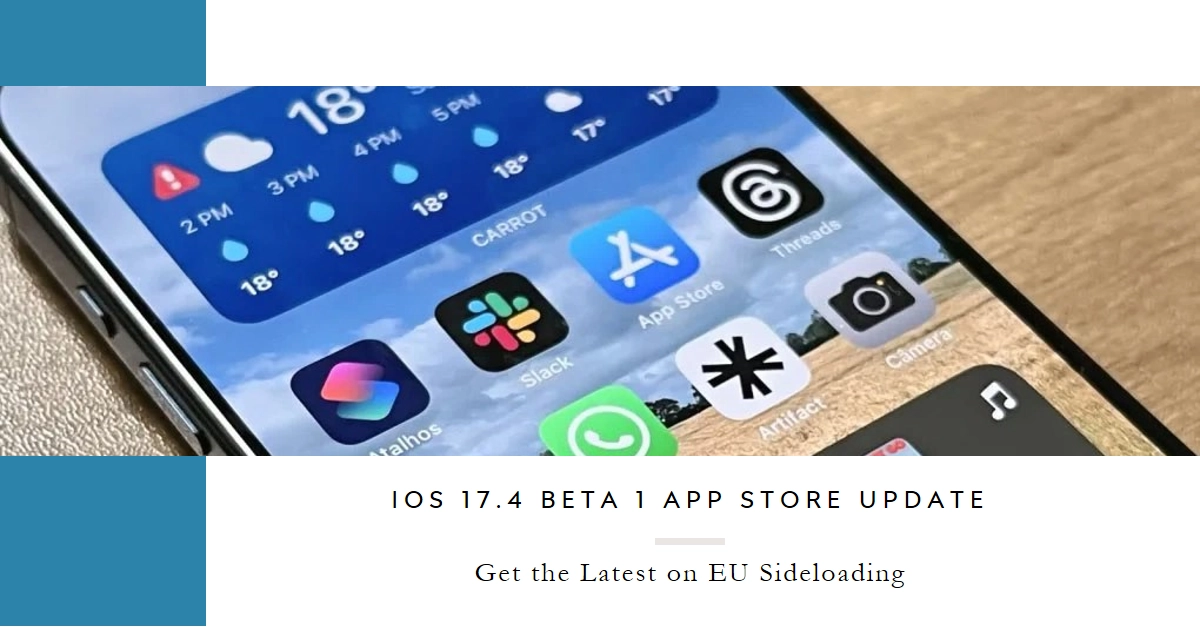The first public beta of iOS 17.4 has arrived, bringing with it a landmark change for iPhone and iPad users in the European Union: sideloading. This means, for the first time ever, you can install apps outside of the App Store, opening up a world of possibilities and potential challenges. But before you dive headfirst into the unknown, let’s take a closer look at what to expect from this groundbreaking update.
EU Sideloading: A Crack in the App Store Wall
The European Union’s Digital Markets Act (DMA) is the driving force behind this historic shift. The DMA aims to promote fair competition in the digital market, and one of its key provisions is that app store operators like Apple must allow sideloading. This means users can download and install apps from alternative app stores, bypassing Apple’s tightly controlled ecosystem.
For EU users, this is a game-changer. It could lead to:
- Greater app choice: You’ll no longer be limited to apps available on the App Store. Alternative app stores could offer a wider variety of apps, including those that Apple might not approve for various reasons.
- Potentially lower app prices: Developers won’t be forced to pay Apple’s 30% commission on in-app purchases through alternative stores, which could lead to lower prices for consumers.
- More innovation: With a more open app ecosystem, developers could experiment and create new kinds of apps that wouldn’t be possible within the App Store’s constraints.
However, it’s important to remember that sideloading comes with its own set of risks:
- Security concerns: Apps downloaded from outside the App Store may not be as rigorously vetted as those on the App Store, increasing the risk of malware and other security threats.
- User experience: Sideloading apps might not be as seamless or user-friendly as installing apps from the App Store. You may need to manually download and install app updates, and some features might not work properly.
- Privacy issues: Some alternative app stores may not have the same privacy standards as the App Store, putting your personal data at risk.
The news that Apple has released the first public beta of iOS 17.4 with EU sideloading is a significant development for iPhone and iPad users in the European Union. Here’s what you can expect:
EU Sideloading
- This is the headline feature of the update, mandated by the EU’s Digital Markets Act (DMA). It allows users to install apps from alternative app stores outside the App Store for the first time on iOS.
- This could lead to greater choice and potentially lower app prices for EU users. However, it’s important to note that Apple will still have some control over the process, requiring alternative app stores to meet certain security and privacy standards.
- It’s unclear how user-friendly the sideloading process will be, and whether it will be as seamless as installing apps from the App Store.
Other New Features
- New emojis: The update includes a new batch of emojis, likely reflecting the latest Unicode standard.
- Podcast transcription: Podcasts will gain automatic transcription, making them more accessible for deaf and hard-of-hearing users.
- Game streaming: Support for game streaming apps like Xbox Cloud Gaming opens up new possibilities for mobile gaming.
- CarPlay updates: The update lays the groundwork for the next generation of CarPlay, which is expected to launch later this year. This could include a more immersive dashboard experience and tighter integration with the car’s systems.
If you’re interested in trying out the beta, you can sign up for the Apple Beta Software Program. However, be sure to back up your device before installing it, as it may not be compatible with all apps and services.
How to Install the iOS 17.4 Beta (with Caution)
Excited to try out iOS 17.4 for yourself? Before you jump in, remember: this is a beta version, meaning it’s still under development and may contain bugs or stability issues. It’s not recommended for everyday use on your primary device.
If you’re still keen to explore, here’s how to install the iOS 17.4 beta:
- Backup your device: This is crucial! Beta software can sometimes cause data loss, so make sure you have a recent backup of your device before installing the update.
- Enroll in the Apple Beta Software Program: Head to https://beta.apple.com/ and sign up for the program using your Apple ID.
- Download the iOS 17.4 beta profile: Once enrolled, you’ll see the iOS 17.4 beta profile available for download. Install it on your device.
- Install the beta update: Go to Settings > General > Software Update and download and install the iOS 17.4 beta update.
Remember that sideloading apps on iOS 17.4 is currently only available in the EU region. Users outside the EU will not see the option to sideload apps. Additionally, sideloading apps from unknown sources carries security risks. Be cautious and only install apps from trusted sources.
Important Notes:
- This is a beta version, meaning it’s still under development and may contain bugs or stability issues. It’s not recommended for everyday use on your primary device.
- The EU sideloading feature is currently only available in the EU region. Users outside the EU will not see this option.
- Sideloading apps from unknown sources carries security risks. Be cautious and only install apps from trusted sources.
How to Sideload Apps on iOS 17.4 Beta (EU Only)
Sideloading apps on iOS 17.4 beta 1 requirements include enrolling in the Apple Beta software program, downloading the iOS 17.4 beta profile and installing the beta update on your device. Once you’ve done all that, you should be all set to sideload apps. Here’s how:
- Restart your device: After installing the beta update, restart your device. Doing so activates the beta profile and prepares your device for sideloading.
- Find your alternative app store or developer source: Locate the website or repository from which you want to download your desired app. Ensure the source is trustworthy and secure.
- Download the app file: Look for the .ipa file of the app you want to sideload. Some app stores may offer direct download links, while others might require manual download from the developer’s website.
- Open the .ipa file on your device: Tap on the downloaded .ipa file. Your device will prompt you with a security warning, informing you that the app is from an “unknown developer.”
- Trust the developer (optional): If you’re confident in the source of the app, tap “Trust” to proceed. This adds the developer’s certificate to your trusted list, allowing future installations from the same source without needing to repeat this step.
- Install the app: Tap “Install” and wait for the app to download and install onto your device.
Overall, the iOS 17.4 beta is a significant update for EU users, offering more choice and flexibility in how they install and use apps. However, it’s important to proceed with caution and be aware of the potential risks before sideloading any apps.
I hope this information is helpful! Let me know if you have any other questions about the iOS 17.4 beta.
FAQ: When will the iOS Sideloading feature be rolled out globally?
So far, iOS sideloading is only available in the European Union (EU) due to the Digital Markets Act (DMA). This regulation mandates that Apple allows alternative app stores and sideloading on iOS devices within the EU region.
Apple hasn’t officially announced plans for worldwide sideloading. However, some sources speculate that:
- It might remain exclusive to the EU: Apple could choose to comply with the DMA only in the EU to avoid the regulatory burden of implementing sideloading globally.
- Gradual rollout: Apple might slowly roll out sideloading to other regions following its implementation in the EU, perhaps starting with countries with similar regulations or a strong developer community.
- Global rollout: While less likely, there’s a slim chance Apple might eventually offer sideloading worldwide due to pressure from developers and regulators.
Ultimately, the decision rests with Apple and their future strategies.
In the meantime, keep your eyes peeled for updates and announcements from Apple regarding potential expansion of sideloading beyond the EU. You can also follow news related to other countries’ regulations and their impact on Apple’s app store policies.

